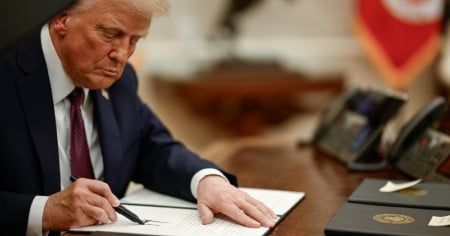The Trump Administration confirmed on Tuesday the start of raids against undocumented immigrants under the direction of the new acting Secretary of Homeland Security, Benjamine Huffman.
The new phase of this effort includes two key measures: the rescission of the Biden Administration's guidelines on immigration law enforcement in “sensitive” areas and the termination of what they characterize as the abuse of the humanitarian parole program, according to a statement issued in the last hour.
Huffman stated that these measures aim to give greater power to Immigration and Customs Enforcement (ICE) officials and Border Patrol (CBP) to enforce immigration laws and apprehend migrants with criminal records.
"Criminals will no longer be able to hide in places like schools and churches," he said, referring to the areas where security forces had previously been restricted in their operations.
One of the most controversial measures announced by Trump is the elimination of humanitarian parole, which under the Biden administration had allowed the temporary entry of over 1.5 million migrants from countries such as Venezuela, Cuba, Nicaragua, and Haiti.
This program will be replaced by a case-by-case assessment, which could further hinder migrants' chances of entering the country legally.
The decision has been criticized by groups of human rights that warn about the devastating impact it will have on the thousands of migrants seeking refuge in the United States, many of whom are fleeing extreme conditions in their home countries.
These groups believe that, rather than protecting the most vulnerable individuals, Trump's policy endangers those seeking safe and legal refuge.
In addition, the former interim director of ICE, Tom Homan, who was reappointed by Trump to oversee border security, announced a series of large-scale raids in November.
During his visit to Eagle Pass, Texas, Homan stated that the administration is ready to carry out one of the largest deportation operations in the history of the country, emphasizing migrants with criminal backgrounds.
This strategy includes mass detentions and an intensification of cooperation with local authorities, especially in Texas, where initiatives are being implemented to strengthen deportation policies.
The rhetoric of the administration, which describes the border situation as a "humanitarian crisis" and an "invasion," has sparked a heated debate.
While some advocate for the need for stricter policies to ensure national security, many critics argue that these policies are inhumane and disproportionate, as they primarily impact individuals fleeing violence and extreme poverty in their home countries.
Frequently Asked Questions about Raids and Mass Deportations under the Trump Administration
What measures has the Trump administration taken against undocumented immigrants?
The Donald Trump administration has begun raids against undocumented immigrants and has eliminated humanitarian parole. These actions aim to empower ICE and Border Patrol officers to apprehend migrants with criminal backgrounds and have faced criticism from human rights groups.
What is humanitarian parole and why has it been eliminated?
The humanitarian parole was a program that allowed the temporary entry into the U.S. of more than 1.5 million migrants from countries such as Venezuela, Cuba, Nicaragua, and Haiti. The Trump administration has eliminated it, arguing that it was an abuse of the immigration system. Now, each case will be evaluated individually, which could complicate legal access to the country.
What is the main objective of the raids and mass deportations announced by the Trump administration?
The main objective is to deport immigrants with criminal backgrounds and enhance border security. This strategy includes mass detentions and an intensification of cooperation with local authorities, especially in Texas.
What challenges does the Trump administration face in implementing its immigration policies?
One of the main challenges is the lack of infrastructure, as at least 100,000 beds would be needed daily to accommodate detained immigrants. Additionally, there are ethical and legal criticisms regarding the deportation of families with children born in the U.S. and the use of the National Guard in operations.
Filed under:
